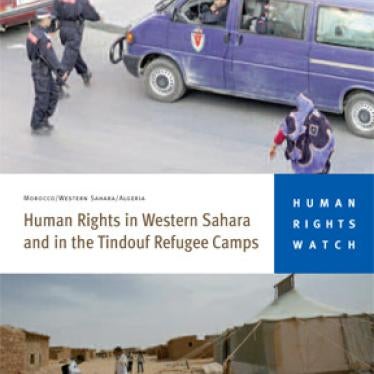The events that engulfed El-Ayoun, the capital of Western Sahara, on November 8 should convince French diplomats to change course on a little known issue, but one which embarrasses even the most seasoned of its diplomats. For several years behind the closed doors of the UN Security Council, France has used its veto power to keep the UN away from issues related to human rights in the territory annexed by its Moroccan ally in 1975.
Without the appropriate mandate, the UN Mission for the Referendum in Western Sahara (MINURSO) was blind to the course of events that erupted last month between the Moroccan police and the Sahrawi militants-the most serious unrest since the cease-fire in 1991. The Security Council, responsible for maintaining international peace, was unable to strike a balance between the Polisario Front independence movement-which condemned the massacre of 36 peaceful demonstrators without proof-and Morocco-which claimed, without credibility, to have liberated thousands of Saharawi civilians allegedly held hostage by "criminals" at a camp erected in protest near El-Ayoun.
If these events had occurred in the Democratic Republic of Congo, Haiti, or Sudan, UN human rights experts would have been dispatched immediately to establish an objective version of events and to inform the Security Council, thus helping to ease tensions. The presence of UN observers would also have been a deterrent to the Moroccan security forces that had repeatedly, according to our findings, beaten those persons arrested following the disturbances.
All UN peacekeeping missions since 1991 have included human rights monitoring mechanisms, based on the observation that any lasting peace should be based on respect for human rights. Elsewhere from Darfur, to Timor-Leste, to Kosovo, France has fully supported the increasing integration of issues relating to human rights in UN missions. The Saharawi issue is the only one where Paris has been unwilling to budge, determined to defend a historical anomaly.
This French stubbornness has a cost. France's ambassador to the UN, Gerard Araud, learned the cost this past April 30, when he faced Security Council members such as the United Kingdom, Austria, Uganda, Nigeria, and Mexico, who are in favor of expanding the mandate of MINURSO to questions of human rights. According to several witnesses, a few hours before the expiration of the UN mission's mandate, the discussion became heated.
How can France, which claims to be the birthplace of human rights, oppose itself to any mention thereof in the resolution, one of the Western ambassadors asked? His Chinese counterpart-rather ironically-welcomed the fact that Paris shared Beijing's reservations on any discussion of human rights in the Security Council. After a heated response from the French ambassador, followed by completely diplomatic apologies, France won its case, not so much by the strength of its arguments as by its veto power.
French diplomats defend themselves by arguing that the issue of human rights has become a red flag for Morocco, which it sees as a trick of the Polisario and its official Algerian support to embarrass the Sharifian kingdom. According to French officials, this issue is a diversion that merely puts the spotlight on Rabat, without advancing the negotiations between the two camps, which have been mired for years.
But instead of aligning itself with Rabat, France should convince Morocco it has everything to gain by improving the living conditions of the Saharawi people under its control, who are often muzzled and harassed by Moroccan security forces when they dare to vote for independence. UN observers would also be of great assistance to Sahrawi refugees living near Tindouf, Algeria, in camps where the Polisario Front reigns supreme and intimidates those who support the Moroccan autonomy plan-a situation denounced by Rabat many times.
The renewal of the MINURSO mandate in April 2011 offers French diplomacy a chance to correct the situation. It is time that Paris recognizes that without a strict observance of the rights of the Sahrawi guaranteed by the UN, both sides will continue to engage in disinformation campaigns in favor of a political solution that only complicate the efforts of the Security Council.
Philippe Bolopion, Human Rights Watch UN Advocacy Director








